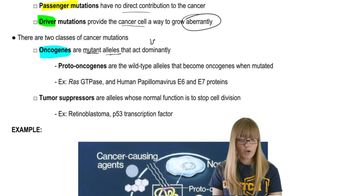What is the difference between saying that cancer is inherited and saying that the predisposition to cancer is inherited?
Table of contents
- 1. Introduction to Genetics51m
- 2. Mendel's Laws of Inheritance3h 37m
- 3. Extensions to Mendelian Inheritance2h 41m
- 4. Genetic Mapping and Linkage2h 28m
- 5. Genetics of Bacteria and Viruses1h 21m
- 6. Chromosomal Variation1h 48m
- 7. DNA and Chromosome Structure56m
- 8. DNA Replication1h 10m
- 9. Mitosis and Meiosis1h 34m
- 10. Transcription1h 0m
- 11. Translation58m
- 12. Gene Regulation in Prokaryotes1h 19m
- 13. Gene Regulation in Eukaryotes44m
- 14. Genetic Control of Development44m
- 15. Genomes and Genomics1h 50m
- 16. Transposable Elements47m
- 17. Mutation, Repair, and Recombination1h 6m
- 18. Molecular Genetic Tools19m
- 19. Cancer Genetics29m
- 20. Quantitative Genetics1h 26m
- 21. Population Genetics50m
- 22. Evolutionary Genetics29m
19. Cancer Genetics
Overview of Cancer
Problem C.10
Textbook Question
What kind of information will be made available by The Cancer Genome Atlas (TCGA)? What sort of role do you think TCGA information will play in cancer diagnosis and cancer treatment in the future?
 Verified step by step guidance
Verified step by step guidance1
Understand that The Cancer Genome Atlas (TCGA) is a comprehensive project that collects and analyzes genomic data from various types of cancer. It provides detailed information about genetic mutations, gene expression patterns, epigenetic changes, and other molecular alterations in cancer cells.
Recognize that TCGA data includes information such as DNA sequence mutations, copy number variations, RNA expression levels, and methylation patterns, which together help to characterize the molecular landscape of different cancers.
Consider how this genomic information can be used to identify specific genetic changes that drive cancer development and progression, enabling researchers and clinicians to classify cancers more precisely based on their molecular profiles rather than just their tissue of origin.
Think about the role of TCGA data in improving cancer diagnosis by allowing for more accurate detection of cancer subtypes and potentially identifying biomarkers that can predict prognosis or response to treatment.
Reflect on how TCGA information can guide personalized cancer treatment strategies, such as targeted therapies that specifically inhibit mutated genes or pathways identified through genomic analysis, leading to more effective and tailored treatment plans for patients.
 Verified video answer for a similar problem:
Verified video answer for a similar problem:This video solution was recommended by our tutors as helpful for the problem above
Video duration:
2mPlay a video:
Was this helpful?
Key Concepts
Here are the essential concepts you must grasp in order to answer the question correctly.
The Cancer Genome Atlas (TCGA)
TCGA is a large-scale project that catalogs genetic mutations responsible for cancer by analyzing the genomes of thousands of tumor samples. It provides comprehensive data on DNA mutations, gene expression, and epigenetic changes across various cancer types, enabling researchers to understand cancer at the molecular level.
Recommended video:
Guided course

Cancer Mutations
Genomic Information in Cancer Diagnosis
Genomic data from projects like TCGA helps identify specific genetic alterations that drive cancer development. This information can improve diagnosis by enabling the classification of tumors based on their molecular profiles, leading to more precise and personalized diagnostic approaches.
Recommended video:
Guided course

Cancer Mutations
Role of Genomic Data in Cancer Treatment
TCGA data supports the development of targeted therapies by revealing mutations and pathways unique to different cancers. This allows for personalized treatment plans that target specific genetic changes, improving treatment efficacy and reducing side effects compared to traditional therapies.
Recommended video:
Guided course

Cancer Characteristics

 9:51m
9:51mWatch next
Master Cancer Characteristics with a bite sized video explanation from Kylia
Start learningRelated Videos
Related Practice
Textbook Question
459
views
